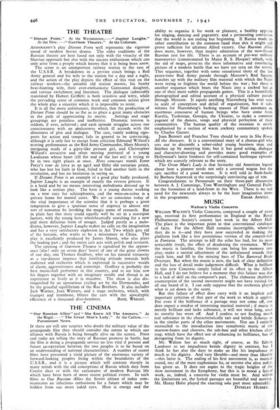THE THEATRE
" Distant Point." At the Westminster. " Jupiter Laughs."
At the New.—" Garrison Theatre." At the Coliseum.
AFINOGENEV'S play Distant Point well represents the vigorous mood of modern Soviet drama. The older traditions of the Russian theatre are here fused not only with the vivacity of the Shavian approach but also with the sincere enthusiasm which can only arise from a people which knows that it is being born anew.
The scene is an unimportant railway station in the east of the U.S.S.R. A breakdown in a private coach brings a Red Army general and his wife to the station for a day and a night, and the action of the play depicts the effect of this visit on the railway workers—the amiable old station master, his hearty bear-hunting wife, their over-enthusiastic Comsomol daughter, and various switchmen and linesmen. The dialogue (admirably translated by Hubert Griffith) is both sensitive and witty, while the pervading sense of common work and common action gives the whole play a sincerity which it is impossible to resist.
It is all the more unfortunate, therefore, that the production of Distant Point should be so flat as to place a great many obstacles in the path of appreciating its merits. Settings and stage groupings are pointless and ineffective. Dramatic tension is seldom, if ever, achieved ; and each episode straggles across our consciousness with an aimlessness which ill accords with the directness of plot and dialogue. The cast, vainly seeking sign- posts for action and tempo; fails in general to be convincing, although it is only fair to except from criticism Edmund Willard's moving performance as the Red Army Commander, Mary Morris's intriguing study of a gipsy-like peasant girl, and Christopher Willard's attractive and often moving portrayal of a young Laodicean whose heart (till the end of the last act) is trying to be in two right places at once. Hors contours stands Esme Percy's tour de force as an aged and filthy old sectarian priest, who has lost his faith in God, failed to find another faith in the revolution, and has no hesitation in saying so.
If Distant Point is an example of a good play badly produced, Jupiter Laughs is an example of exactly the reverse process. It is a lurid and by no means interesting melodrama dressed up to look like a serious play. The hero is a young doctor working on a new cure for schizophrenia, and the mise-en-scene is a private home for mental cases. We are so conscious today of the vital importance of the scientist that it is perhaps a great temptation to give a spurious sense of urgency to almost any sort of nonsense by invoking the magic name of research. But in plain fact this story could equally well be set in a marzipan factory, with the young hero wholeheartedly searching for a new 'and more delicious form of nougat. Judged purely as a melo- drama, however, Jupiter Laughs makes no calls on the imagination and his a very satisfactory explosion in Act Two which gets rid of the heroine, who wants to be a missionary in China. The play is excellently produced by James Mason, who also plays the leading part ; and the entire cast acts with polish and resource.
The opening of Garrison Theatre is signalised by the appear- ance (alas! only on seven days' leave) of one of the great clowns of our day, one Thomas Godfrey, whd on his natural virtuosity as a tap-dancer imposes that terrifying attitude towards both audience and orchestra which is expressed in successive moods of alarm, aggressiveness and contempt. Godfrey is probably the best music-hall performer in this country, and to see him sew his fingers together with an imaginary needle and thread is an experience as lively as it is macabre. The show is also dis- tinguished by an uproarious cycling act by the Dormondes, and by the graceful equilibrium of the Rao Brothers. It also includes Jack Warner, Joan Winters, and a stage orchestra, which, with trumpet and trombone, blitzes the ears with the apocalyptic
efficiency of a thousand dive-bombers. - BASIL WRIGHT.






















 Previous page
Previous page